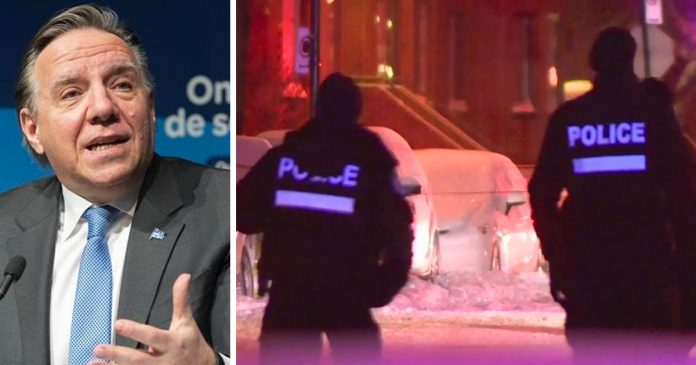A new study has found that Quebec’s pandemic response, which included some of the harshest restrictions in the Western world, handed out tens of thousands of fines with no discernible effect on COVID transmission rates.
La Presse reported Friday the findings of four researchers from the University of Montreal’s Profiling Observatory (l’Observatoire des profilages), who concluded that “Quebec chose to turn the public health crisis into a public safety crisis.”
The researchers analyzed infractions related to COVID-19 restrictions, including gathering limits, the curfew, mask mandates and vaccine passports.
Quebec authorities gave out 46,563 infractions related to COVID-19 restrictions between Sept. 20, 2020 and Oct. 3, 2021, which averages about 123 per day.
The number of infractions was highest in the spring and winter months of 2021, when the province’s first police-enforced curfew was in effect.
There was an average of 1,093 weekly infractions in January, February and March 2021, and 2,232 in April and May. The curfew was in effect during most of this time.
In contrast, the province averaged 206 COVID-19 infractions per week in the fall, when a curfew was not in effect.
The researchers found that the number of infractions and cases of COVID-19 do not correlate.
The province’s second wave peaked the week of Dec. 28, 2020, when the number of infractions remained low, while the number of infractions began increasing in Jan, after the province imposed its first curfew on Jan. 9, 2021.
The researchers did, however, caution against drawing conclusions. Stating that “presumably, the rationale for issuing citations is to punish and deter those who do not comply with public health rules, in order to reduce contacts and possibly the number of COVID-19 cases.”
They added that their data does not allow them “to measure the effect, or lack of effect, of the issuance of tickets on the number of cases of COVID-19, nor the dissuasive effect of the imposition of criminal sanctions on behaviour.”
The researchers did have some strong criticism of Quebec premier Francois Legault’s pandemic approach, which they say relied on police suppression and criminal law to enforce public health measures.
They used data from the Canadian Civil Liberties Association and the Pandemic Mapping Project to show that Quebec gave out huge numbers of infractions related to pandemic enforcement.
Between Apr. 1 and Jun. 15 2020, Quebec gave out 66% of the approximately 10,000 COVID-19 infractions in Canada.
Quebec’s rate of infractions was also one of the highest in the country, at 0.51 per 1000 people between Oct. 2020 and Feb. 2021. That is more than half of Ontario’s rate, which was 0.22 per 1000 people.
The researchers also said they believed the Quebec government’s approach was political, writing “this is a political choice, not an unavoidable obligation to ‘flatten the curve’.”
On top of being political, researchers said the pandemic response was also divisive because of “the punitive approach and the repressive discourse pitting the ‘minority’ of people who are recalcitrant to the measures against the ‘majority’ of people who comply with them.”
The researchers’ comments align with a recent Angus Reid Poll, which found that 82% of Canadians believe that “the pandemic has pulled people apart.”
The Profiling Observatory’s study is only the latest blow to the Quebec government’s credibility when it comes to COVID-19 restrictions.
True North previously reported that Quebec’s former top doctor Horacio Arruda wasn’t able to justify recommending a second curfew hours before it was announced.
An access to information request also found the province’s national institute of public health (INSPQ) did not have any documents related to studies showing the effectiveness of curfews or vaccine passports.
Furthermore, it was revealed at a committee meeting in Dec. 2020 that Quebec’s public health had recommended restaurants remain open in the red zones of Quebec’s COVID-19 framework. However, Legault opted to shut them down.
With COVID-19 cases now dropping and a provincial election looming in the fall, the Quebec government has begun removing restrictions. All measures except for the mask mandate were lifted on Saturday.
The province has said it plans to do away with masking in most settings by mid-April.






















